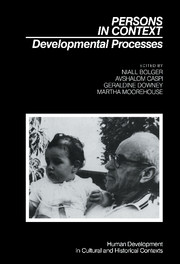Book contents
- Frontmatter
- Contents
- Preface
- Contributors
- 1 Development in context: research perspectives
- 2 Interacting systems in human development Research
- 3 Children, families, and communities: ways of viewing their relationships to each other
- 4 Human development and social change: an emerging perspective on the life course
- 5 Family process: loops, levels, and linkages
- 6 On the constructive role of problem behavior in adolescence
- 7 The sociogenesis of self concepts
- 8 Putting persons back into the context
- 9 How genotypes and environments combine: development and individual differences
- Author index
- Subject index
5 - Family process: loops, levels, and linkages
Published online by Cambridge University Press: 04 May 2010
- Frontmatter
- Contents
- Preface
- Contributors
- 1 Development in context: research perspectives
- 2 Interacting systems in human development Research
- 3 Children, families, and communities: ways of viewing their relationships to each other
- 4 Human development and social change: an emerging perspective on the life course
- 5 Family process: loops, levels, and linkages
- 6 On the constructive role of problem behavior in adolescence
- 7 The sociogenesis of self concepts
- 8 Putting persons back into the context
- 9 How genotypes and environments combine: development and individual differences
- Author index
- Subject index
Summary
The relation of family to the culture contains many contradictions. On the one hand, the family's function is to make the next generation ready for socialization by agents outside the family. On the other hand, it is the function of a small number of families to prepare individuals who will function as agents of change. The family must somehow retain its sense of identity while one half of its members prepare to enter and the other half prepare to leave society. This tiny, transitory social system floats in a societal sea that is constantly making contradictory demands for changes and, simultaneously, for constancy and equilibrium. Clinicians and developmentalists alike would agree on the necessity for the study of change. The official imprimatur for such studies has been issued and reissued for decades. It is not a lack of interest or commitment that prevents our working in this area; it is simply that we do not know how to proceed. This chapter outlines some metaphors that seem appropriate to the study of process. Data will be presented at several points to illustrate the utility of thinking about it in this way.
As employed here, the term process refers to behavior changing over time along a discernible trajectory. A plot of the changes over time in children's height and weight would be one example of a process. Changes over time in musical skill, or in the skills that maintain acquaintances, friends, or building intimate relationships would be other examples.
- Type
- Chapter
- Information
- Persons in ContextDevelopmental Processes, pp. 114 - 151Publisher: Cambridge University PressPrint publication year: 1989
- 2
- Cited by

